22→25
September
2022
@Parco Dora, Turin
Join a free, social-design workshop on 5 food issues with some of the most engaging and creative people in grassroots food work!
Innovate solutions to social food problems!
With a group of creatives, grassroots gastronomic experts, activists and youth from different backgrounds within the Slow Food Youth Network, you can impact future food initiatives.
SFYN Tank is an experimental event aimed at squaring open-exchange of expertise at the centre of food activism. Aimed at any youth in grassroots food work or creative sectors, we hope to engage food enthusiasts in collective problem-solving through design-thinking.
Come attend our social-design workshop which will take place at Terra Madre 2022 from September 22nd to September 25th. You will employ a multidisciplinary approach that encompasses research, storytelling, idea-generation and prototyping with a critical design eye to solve five social problems our food system faces–from raising the bar of food deliveries to protecting ocean and land rights.
Through open-exchange of expertise, out-of-the-box thinking, and a design approach, we truly can make a meaningful impact on our global food system.
WHAT
days of social-design session
food issues
hours
tankers
WHERE
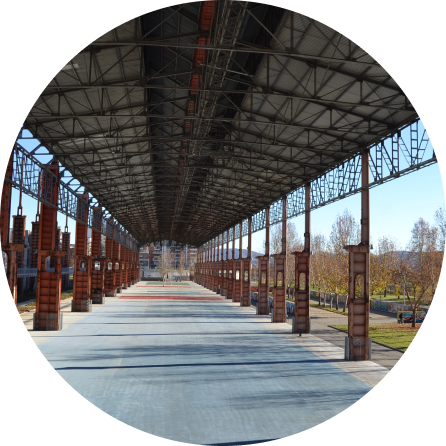
Parco Dora
(Berta Caceres Arena and Activism workshop rooms)
Corso Mortara,
10149 Torino (TO)
THE TANK ISSUES
Set aside the pesticide
It has been shown that an abundant use of pesticides in agriculture has a negative effect on the health of local farmers and inhabitants, as well as on pollinators and on the ecosystem in general: how can communities support their local producers in phasing out pesticides in the local food chain?
Decriminalize seed sovereignty in Kenya.
The farmer managed (informal) seed sector is not favoured by Kenyan law, even though this sector ensures food security and farmers’ sovereignty over their genetic resources. Whereas the status quo is formed by the commercial seed sector, which brings together seed companies that either produce the seeds in the country or that by large extent import seeds and pack them in a centralised place. How do we protect seed sovereignty in Kenya?
Support your local food chain!
Monocultures and production of certain foods displace others. For example, monocultures of barley for large-scale beer production displace the production of raw ingredients for local traditional drinks and foods. How do we promote the local food culture, and make the production of its ingredients more commercially interesting for farmers? Tasty, isn't it?!
Food deliveries, raising the bar.
Food delivery services are more and more present in our daily lives in different parts of the world. In Tokyo, for instance, during weekdays ordering food delivery instead of cooking a meal is the normality. Despite that, even if resellers claim to offer "healthy food", they are not related to the local food culture or they don't use local ingredients. How can food delivery services be promoters of healthy meals made of local and fresh ingredients? Oh, and have we spoken about the riders rights yet?
Protect the ancestral peoples of the sea and mangroves.
Over the last 50 years, the original mangrove ecosystem has mostly been destroyed to make way for industrial shrimp farming ponds and the remaining hectares are now privatised, handed over through Use and Custody Agreements to a few associations of harvesters and fishermen. The reality behind this is that some of the local people who have lived, fished and harvested in these areas for centuries are evicted, threatened and, in some cases, even killed. Obviously systemically violating the rights of ancestral mangrove peoples and exposing them to constant vulnerability. The loss of traditional cultural practices related to the ancient peoples of the sea and mangroves is another consequence of the destruction of coastal marine ecosystems, as well as the rise of armed groups and drug trafficking cartels. Let’s get back in clear water.
COACHES
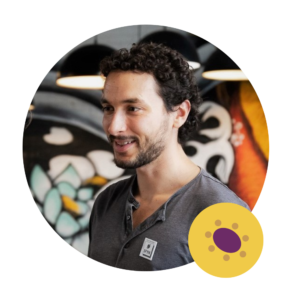
Andrea Bolognin
Issue Coach for
"Set aside the pesticide"
He is an Italian gastronome and works in the field of food education. Constantly transforming the current educational system in favor of a more inclusive and horizontal one.
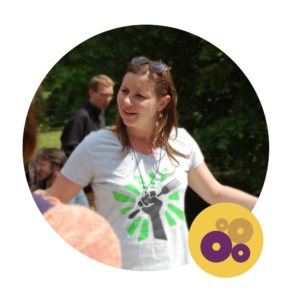
Louise Duhan
Issue Coach 2 for "Food deliveries, raising the bar".
She has been coordinating the Slow Food Youth Germany Network since 2014. She loves the fact that this worldwide grassroots movement is locally active but globally connected. Her favorite and most unforgettable Slow Food experience? Sitting at a table and eating together with people from over 160 other countries at the Terra Madre Salone del Gusto in Turin!
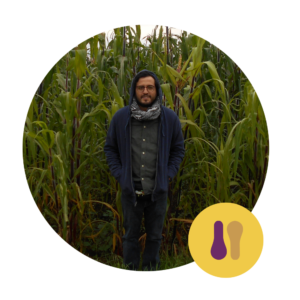
Raúl Mondragón
Issue Coach for "Support your local food chain!"
He has a background in administration and worked in the entertainment and tourism industries. As a reaction to the industrial approach in the food system, he developed strong ideals to seek socio-environmental justice for Mexico from agroecology and peasant organizations. He studied for a master's degree in agroecology and regenerative food systems and founded Colectivo Ahuejote. With his project he aspires to reactivate and promote Chinampera agriculture to guarantee healthy, good and fair food for the population of Mexico City.

Gabriela Bonilha
Issue Coach for "Decriminalize seed sovereignty in Kenya"
With experience in various areas of communication, Gabi uses her knowledge and skills to promote a sustainable future. She particularly focuses on video production in all its stages and works with motion design. She is the coordinator of the Slow Food Youth Network Brazil, she is part of the advisory board of Slow Food Brazil and is the founder of the Brazilian Academy. On a global level she has been part of the international World Disco Soup Day task force to tackle food waste and she is part of the global SFYN Academy coordinators group.
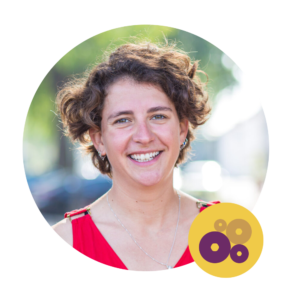
Arjanne Bode
Issue Coach 1 for "Food deliveries, raising the bar"
She was a SFYN Academy coordinator for SFYN Netherlands and is part of the Global SFYN Academy team. Educated as a designer and working as an organizer of educational food events, in and outside SFYN, she strongly believes in the power of connecting people, sharing knowledge, creativity and having fun.
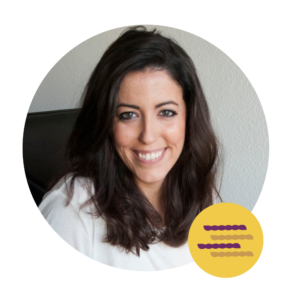
Elia Carceller
Issue Coach for "Protect the ancestral peoples of the sea and mangroves"
Elia coordinates the Slow Food Youth Academy in Germany since its beginning in 2017. She studied Agricultural and Environmental Sciences at the University Polytechnic of Valencia and is a PhD candidate at the Martin Luther University in Halle and investigates on food as a commons discourses. Food is her profession, passion and hobby!

Maria Geuze
Is the freshly new director of SFYN Netherlands and a Systemic Designer. She believes in the younger generation to solve problems in our food system, but only when working together with all levels of society and players involved. With her experience in Systemic Design she will help the participants during the start of the SFYN Tank, by introducing the method and giving tools for solving problems together with a designer eye.
THE PROGRAM
The SFYN Tank is a great occasion for networking with youth from all over the world who, like us, care about building more sustainable food systems. In this design thinking workshop you will brainstorm solutions, prototype your best idea and pitch it to the Terra Madre audience. The five issues have been given to us from real communities in the Slow Food network, so you will have the chance to support them concretely with your innovative solutions.
In Collaboration with

Funded by the European Union
Views and opinions expressed are however those of the author(s) only and do not necessarily reflect those of the European Union or CINEA. Neither the European Union nor CINEA can be held responsible for them.